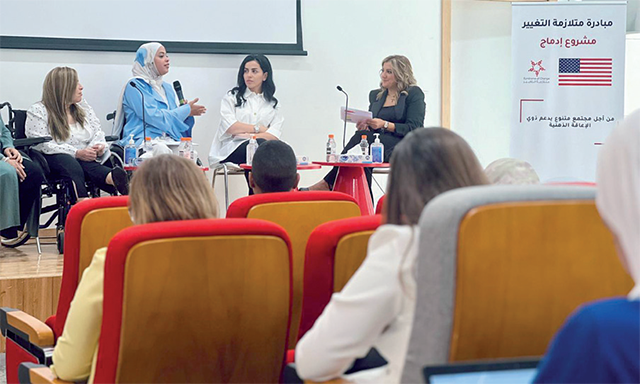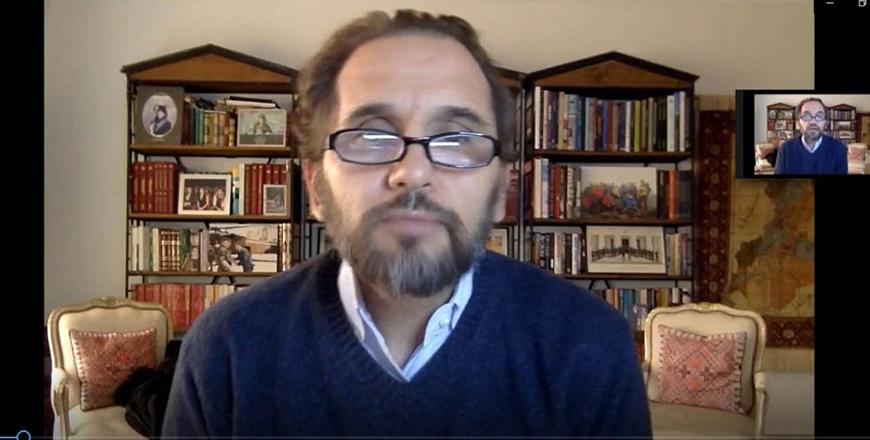You are here
Syndrome of chaange’ project: Improving representation of people with intellectual disabilities in medias
By JT - Jun 28,2024 - Last updated at Jun 28,2024

Photo courtesy of EDMAJ
AMMAN — A dialogue session was held at the auditorium of Hussein Technical University within the activities of the “EDMAJ” project, funded by the US Embassy in Amman. The project is part of the “Syndrome Of Chaange” initiative, which began in 2016 within the MEPI Fellowship programme. It aims to shed light on the importance of the media in promoting a positive and accurate image of people with intellectual disabilities, according to a statement for The Jordan Times.
Significant challenges face this group in society, requiring continuous efforts to address negative stereotypes and promote their active integration into all aspects of public life, especially in the media, which plays a pivotal role in shaping ideas and attitudes.
The session was attended by 60 people from various international, governmental and local organisations, reflecting the growing interest in disability issues and their proper and positive representation in the media.
The opening of the session began with a speech by Noor Rowdan, a representative of the “Syndrome Of Chaange” initiative. Rowdan stressed the importance of this meeting as a starting point for achieving tangible progress in improving media representation of individuals with intellectual disabilities. The session, which was characterised by wide interaction and participation, was facilitated by Zinah Khshashneh, and witnessed prominent contributions from influential figures such Excellency Ain Asia Yaghi, Amal Ayish, an inspiring mother with a daughter with intellectual disabilities, Hadeel Abu Sufa, a human rights activist and Amani Shoubki, a distinguished journalist. Each of them provided a specialised perspective and practical experiences on how to improve media representation and the positive impact it can have, according to the statement.
The discussion during the session addressed various topics focused on policies and procedures to support the promotion of positive representation of people with intellectual disabilities. The stereotypical images that are often present in the media and how they negatively affect the community’s perception of this group were discussed. The role of families and civil society in influencing the media to adopt more accurate and fair approaches in representing people with disabilities was also addressed. These topics are of great importance because they affect the lives of many people and their ability to actively integrate and achieve equal opportunities.
Diala Jarar from the US Embassy in Amman spoke about the embassy’s role in supporting initiatives aimed at improving the social integration of people with intellectual disabilities. Jarar stressed the importance of the media in highlighting the challenges and successes achieved by people with disabilities, expressing her pride in supporting such initiatives that work to integrate people with disabilities into Jordanian society more effectively.
Similarly, Wasem Khalifah, the founder of the “Syndrome Of Chaange” initiative, participated by emphasising the importance of presenting people with intellectual disabilities in the media in a way that respects their rights and avoids a pity-based view. Khalifa stressed that the initiative is continuing to support the “champions” of people with intellectual disabilities in Jordan, emphasising the pivotal role that the media plays in changing perceptions and promoting opportunities for social integration, the statement said.
The audience’s participation significantly contributed to the success of the session, adding new dimensions to the discussion and contributing to deepening understanding and awareness of the importance and necessity of improving media representation of people with intellectual disabilities. The discussions that took place were evidence of the urgent need to change stereotypical images and promote a positive image that supports achieving equality and active integration for people with disabilities in all aspects of public life.
Related Articles
HRH Prince Raad, president of the Higher Council for the Affairs of Persons with Disabilities, on Tuesday called on officials and public and private institutions to cooperate in finding solutions to the challenges facing people with disabilities.
AMMAN — The Higher Council for the Rights of Persons with Disabilities (HCD) on Tuesday signed a cooperation agreement to enhance the role o
AMMAN — Under the patronage of HH Prince Mired, president of the Higher Council for the Rights of Persons with Disabilities (HCD), an online












